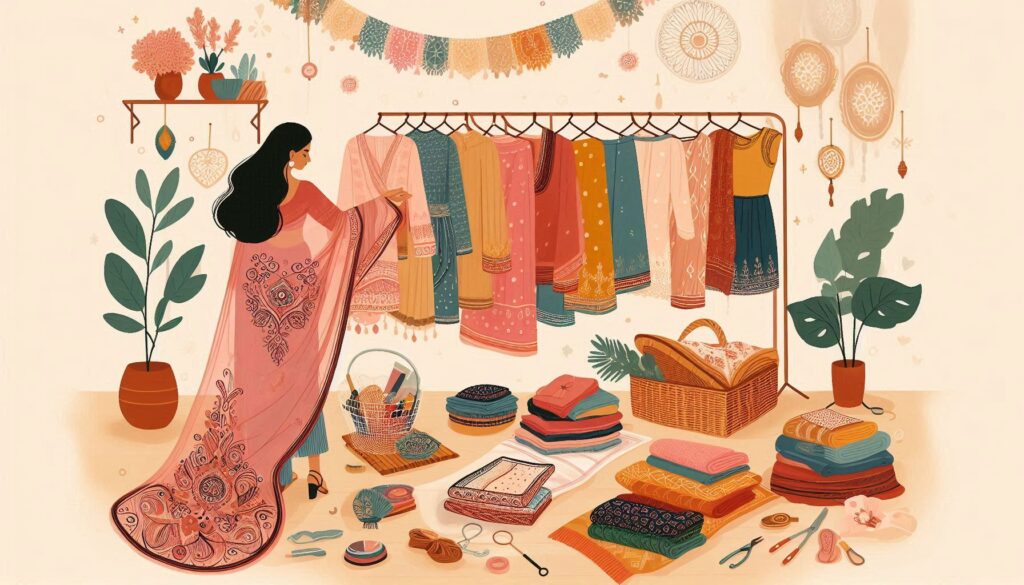Bagru sarees—characterized by their earthy tones, geometric motifs, and hand-block printing—have transcended their Rajasthani roots to become cultural icons.
From Bollywood wardrobes to UNESCO’s Intangible Cultural Heritage lists, these textiles exemplify how traditional craftsmanship thrives in contemporary media. This article analyzes:
- The historical significance of Bagru printing
- Their resurgence through celebrity endorsements and OTT platforms
- Challenges in preserving authenticity amid mass production
- Data-backed strategies for sustainable adoption
The Cultural Legacy of Bagru Sarees
Origins and Techniques
Developed by the Chhipa community in Rajasthan’s Bagru village, these sarees use:
- Natural Dyes: Indigo (neel) and turmeric (harda) for base colors
- Dabu Printing: Mud-resist technique creating signature white outlines
- Sustainable Processes: Zero synthetic chemicals, as validated by a 2022 Craft Council of India report
Challenges in Modern Markets
Despite UNESCO’s 2019 recognition of Bagru printing, artisans face:
- Competition from digital prints (35% cheaper, per Textile Ministry data)
- Declining interest among youth in hand-block printing careers
- Greenwashing by fast fashion brands mimicking Bagru designs
Media Strategies Reviving Bagru Tradition
Case Study: Bollywood’s Influence
- Padmaavat (2018): Deepika Padukone’s Bagru-inspired lehenga sparked a 200% sales surge (Rajasthan Textile Board).
- Gully Boy (2019): Alia Bhatt’s ivory Bagru saree drove 15K+ Google searches for “Bollywood traditional sarees.”
Social Media Campaign
- #BringBagruBack: 12K+ Instagram posts by influencers like Masoom Minawala
- E-commerce Collaborations: Myntra’s 2023 “Craft Canvas” collection sold 8,000+ Bagru sarees in 3 months.
Data-Driven Insights and Sustainable Practices
Market Growth Statistics
| Year | Global Hand-blocked Textile Market | Bagru Saree Contribution |
|---|---|---|
| 2020 | $2.1B | 18% |
| 2025 | $3.4B (projected) | 27% (projected) |
| Source: Grand View Research (2023) |
Eco-Friendly Certification Programs
- IGNOU’s Artisan Training: 600+ Bagru craftsmen trained in natural dye chemistry (2021–2023)
- GOTS Certification: 12 Bagru cooperatives now meet global organic standards.
FAQs
Q: How do I identify authentic Bagru sarees?
A: Check for slight irregularities in patterns (handmade), vegetable dye odors, and artisan certification tags.
Q: Are Bagru prints machine-washable?
A: No. Handwash with mild detergent to preserve natural dyes.
Q: Which celebrities popularized Bagru sarees recently?
A: Sonam Kapoor (Paris Fashion Week 2022) and Vidya Balan (BBC’s Indian Iconic Dresses series).
Conclusion
From royal courts to Netflix series, Bagru sarees have mastered the art of cultural adaptation without compromising authenticity. Supporting certified cooperatives like Dastkari Haat Samiti ensures this 300-year-old legacy endures.
Own a Bagru saree? Share your story with #MyBagruJourney to inspire others.
I am Ankita Nama, a lifelong resident of Bagru, is passionate about sharing her hometown’s rich artistic heritage. Through this blog, she aims to preserve and promote the traditional block printing craft that has shaped her community for generations.



